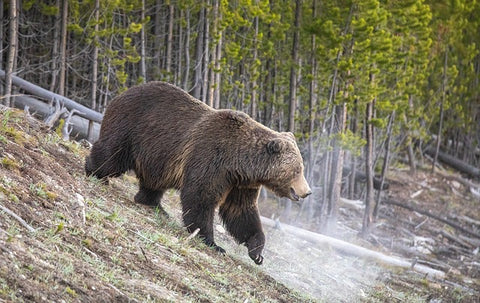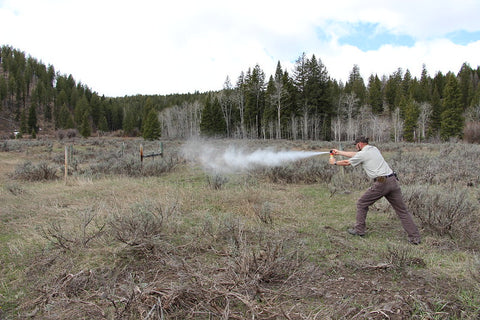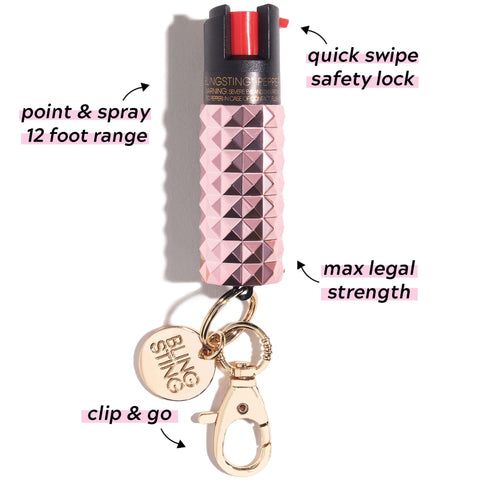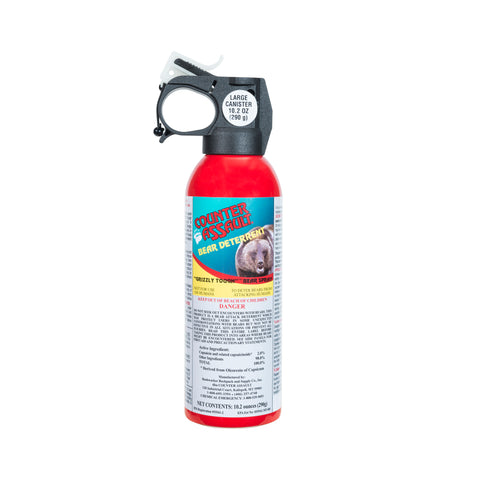What is the Difference Between Pepper Spray and Bear Spray?
Bear spray and pepper spray contain a common active ingredient oleoresin capsicum, a spicy oil from cayenne peppers. This fact surprises many people because it's common in both. However, while both sprays can stop an attack, they serve very different purposes.
Our article breaks down how each type works, their main differences, why one might work better than the other in certain situations, and what laws say about using them. After reading this post, you'll know exactly which spray to pack for peace of mind on your next adventure or as part of your daily self-defense tools.
Let’s go into detail to know the applicability and use of each one.
Table of Contents
Key Takeaways
- Bear spray and pepper spray both have oleoresin capsicum but are used for different threats. Bear spray has a higher concentration and works against bears in the wild, while pepper spray is for human attackers.
- Bear spray shoots a wider mist to stop bears from up to 30-40 feet away. Pepper spray aims at a direct stream, effective at a closer range of 10-12 feet against human attackers.
- Laws around bear and pepper sprays differ; bear spray is regulated by the EPA approved for bear use only and is hazardous to humans. Pepper spray rules vary by state and focus on self-defense.
- The strength of capsaicin in bear deterrents is higher at 2% than in personal defense sprays which is about 1 to 1.33%.
- Choosing between bear and pepper sprays depends on the situation—bear deterrent for wilderness adventures with potential bear encounters, pepper aerosol for personal protection in urban settings.
Understanding Bear Spray

Bear spray protects humans from a bear attack through a strong mist with capsaicinoids that cause temporary swelling of the membranous linings of the eyes, nose, and lungs, which causes breathing difficulties.
How Does Bear Spray Work?
Bear spray uses a powerful red pepper solution that comes in a pressurized can to deter bear attacks. This spray has oleoresin capsicum, which is very spicy and causes bears to feel burning in their eyes, nose, and lungs.
When you use bear spray, it shoots out a wide cloud that can reach far from 30-40 feet. This means you can hit a bear with the spray from a safe distance before it gets too close.
The key thing about bear spray is its strength and how far it can go. It's stronger than pepper sprays used by people for self-defense, but because it needs to cover more ground to stop a wild animal, it comes out as a wide cloud and reaches farther distance. Keep in mind when using your bear spray that you should be mindful of the current wind direction so that it deploys in the intended target.

After talking about how bear spray works, we'll look at pepper sprays next.
Understanding Pepper Spray
Pepper spray is a self-defense tool against human attacks. It makes an attacker's eyes shut and causes much pain. If you want to stay safe on the streets, knowing how it works can help a lot.
How Does Pepper Spray Work?
Pepper spray packs a punch with a spicy ingredient called capsaicin. This is the same stuff that makes chili peppers hot. The spray shoots out a mist made of tiny particles. These particles stick to anything they touch, like skin or eyes.

Once they land, they cause burning pain and often make it hard for someone to see because their eyes shut tight in reaction.
This tool is not just for protection against assailants; it can also stop aggressive animals in their tracks. But remember, this powerful defense has limits based on its range and how accurately you aim it.
So, it's great at close distances of up to 12 feet, but won't do much from far away.
Key Differences Between Bear Spray and Pepper Spray
Let's talk about what sets bear deterrents apart from personal defense sprays. Both have their place in our safety toolkit, but they're not interchangeable.
In a nutshell, a bear deterrent is a heavyweight when it comes to stopping a charging grizzly, while personal defense sprays are your go-to for personal protection against threats of human assailants or aggressive dog attacks. Let's break it down in a table for clearer insight.
Bear Spray |
Pepper Spray |
|
Active ingredient |
Stronger concentration at 2% Capsaicin and related chemicals |
Lower concentration of Capsaicin at 1 to 1.33% and related chemicals |
Delivery and range |
Deters a bear with a larger cloud of mist, reaching 30-40 feet |
Targets a direct stream, with an effective reaching 10-12 feet |
Usage/Purpose |
Designed for large animals, especially bears |
Designed for human attackers and aggressive dogs |
Portability |
Not as flexible for daily carry and comes in a bigger pressurized can (the size of hair spray) |
More versatile and easier to carry daily |
Legal control |
Legal in all 50 states but best to check local laws for age and additional restrictions |
Bear deterrent tosses out a cloud that can stop a bear in its tracks, making it a must-have for wilderness adventurers. On the flip side, personal defense sprays give you a targeted defense against muggers or aggressive dogs, including pit bulls. Both tools are vital, but knowing which to use—and when—could make all the difference.
The Effectiveness of Bear Spray Vs. Pepper Spray
After exploring the differences, we see how each type of spray works best in its intended setting.
Bear spray has more power and is made to stop bears, not people. It shoots farther and covers a wider area to keep a bear away. This makes it good for outdoor adventures where you might come face to face with a bear.
Pepper spray, on the other hand, is better for personal safety against humans. It causes intense pain and temporary blindness but doesn't have the same range or spread as bear spray.
Laws make sure bear spray works well and safely while pepper sprays are picked more for self-defense against attackers. So, choosing between them depends on whether you're facing wild animals or human threats.
Laws and Regulations: Bear Spray Vs. Pepper Spray
Moving on from the effectiveness of bear spray and pepper spray, it's key to understand how laws and regulations differ between the two. Yes, both can stop an attacker, but the rules around them are not the same.
|
Aspect |
Bear Spray |
Pepper Spray |
Regulating Body |
EPA (Environmental Protection Agency) |
Varies by state, no federal oversight |
Active Ingredients |
1-1.33% concentration of capsaicinoids |
|
Regulations |
Approved for bear use only, hazardous to use against humans |
Bear spray is watched over by the EPA, making sure it's both effective as a deterrent vs bears. Its active stuff must be within 1%-2%. According to a study published by Wildlife Management, the efficacy of bear spray is between 90-100% in preventing bear attacks.
Pepper spray, though, isn't checked by any federal group. It's up to each state to make their own rules. It is legal to purchase and carry starting at 18 years, but what's okay in one place might not be in another. Bear spray is all about protecting humans against bear attacks. Pepper spray is for keeping people safe from other people.
In Summary: The Difference Between Bear Spray and Pepper Spray

Bear spray and pepper spray have the same base but serve different foes. Bear deterrents protect you from wild animals in forests. Pepper aerosols defend against people in close spaces.
Bear sprays and pepper sprays contain the same active ingredient which is oleoresin capsicum. The differences are the concentration of the active ingredient, the mode of delivery, and the range of reach, with bear sprays having a higher concentration and a farther range which makes it the choice of defense during outdoor adventures against bear attacks. Pepper sprays, having a lower concentration and shorter reach, is ideal as an everyday self-defense tool against human assailants and aggressive dogs.
Whether pepper spray or bear spray, Penal Code section 22810 in California states that it is a crime for someone to buy, possess, or use tear gas for any purpose other than self-defense and can be charged with misdemeanor or a felony.
FAQs
1. What's the big deal with bear spray vs pepper spray?
Mainly the issue is the purpose of use which makes their features different. Bear spray is made to stop a charging bear, has a higher concentration, and it shoots farther. Pepper spray is for self-defense against humans and smaller aggressive animals..
2. Is it OK to use bear spray for self-defense?
While pepper sprays and bear sprays are not interchangeable and pepper sprays are the preferred option for self-defense, if there are no other options, you can use bear spray as a last resort when you have no pepper spray available and solely for self-defense. Keep in mind that bear sprays come in bigger pressurized cans like a hair spray and are less convenient to carry for everyday protection compared to a very handy pepper spray.
3. Is bear spray stronger than pepper spray?
Yes, bear sprays on the market are about 2% OC concentration while pepper spray is between 1 to 1.33% OC concentration. In addition, bear sprays come in pressurized cans and thus have a stronger power of distance at 30-40 feet compared to pepper spray’s reach at 10-12 feet.
4. Can bear spray blind you?
Bear spray being pressurized, shoots at about 70 mph and if fired at close range can cause permanent eye damage.
5. Is it illegal to use bear spray for self defense?
While bear spray has been approved for bear use only and is classified as pesticide,thus illegal to be used on humans, based on lawyers' answers. as with pepper gas or tear gas, using bear spray is legal IF used for self-defense and should only be a last resort. In California, Penal Code section 22810 states that it is a crime for someone to buy, possess, or use pepper spray, tear gas for any purpose other than self-defense and can be charged with misdemeanor or a felony.
